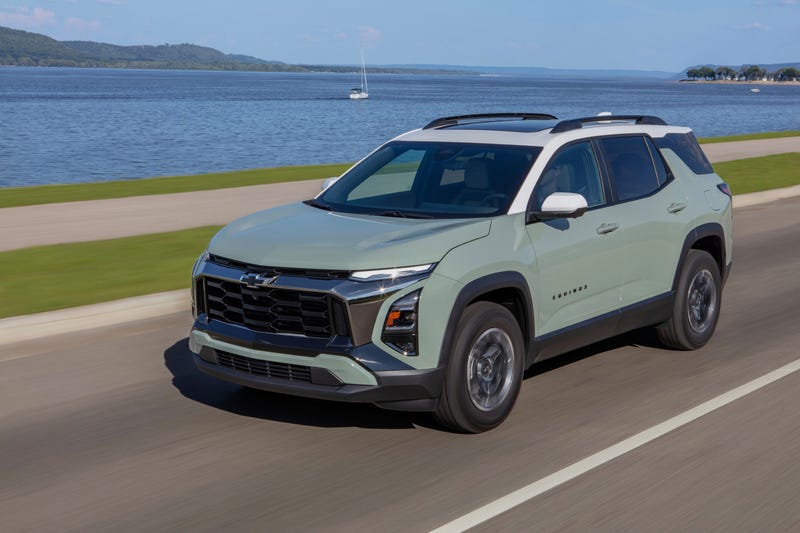
The Chevrolet Equinox and Hyundai Tucson are two popular choices for shoppers looking at small SUVs. They’re also notable for their recent updates. The Equinox’s 2025 redesign ushers in more squared-off styling, technology and safety-related upgrades, and a new rugged-looking Activ trim level. The Tucson’s updates are milder but include refreshed styling and new tech features.
You could make a case for either model if you’re looking to buy a sensible SUV this fall. But which one is better? Edmunds’ automotive experts compare the key differences below.
Fuel economy and performance
The Chevrolet Equinox employs a 175-horsepower turbocharged four-cylinder engine. It’s adequate for routine driving, but passing moves and quick merges onto the highway will require some patience while you get up to speed. In Edmunds’ testing, an all-wheel-drive Equinox needed 8.7 seconds to get from zero to 60 mph. The EPA estimates that the Equinox can get 27 mpg in combined city/highway driving with front-wheel drive. Opting for all-wheel drive lowers the combined figure just a bit to 26 mpg.
The base Hyundai Tucson suffers a worse fate than the Equinox. Its 187-horsepower engine plods from zero to 60 mph in 10.2 seconds in our testing. Fortunately, Hyundai also offers a Tucson Hybrid. It makes substantially more power — 231 horsepower — and gets a boost in fuel economy. The EPA estimates it can get up to 38 mpg combined. A gas-only Tucson gets up to 28 mpg combined.
Chevrolet doesn’t offer a hybrid version of the Equinox. But if you’re open to the idea of owning an electric vehicle, there is the all-electric Equinox EV. It’s a completely different model from the regular Equinox, and it’s quicker and more efficient. It can also travel an estimated 319 miles on a single charge. It’s priced thousands of dollars more than the gas-powered Equinox, however.
Advantage: Hyundai Tucson
Interior space and cargo room
The Hyundai Tucson measures up larger on paper and in reality than the Chevy Equinox. The Tucson has 41.3 inches of rear legroom, which makes it one of the roomiest in the class. Stacking a 6-foot-tall passenger behind a 6-foot driver won’t knock any knees. Fold down the 60/40-split rear seats and the vast cargo space expands from 38.7 cubic feet to 74.8 cubic feet.
The Equinox is relatively roomy, with 39.9 inches of rear legroom. Up front, it has a tiered console with clever storage spots and deeper storage areas than the Tucson. But it does lose out to the Tucson for maximum cargo hauling ability. Cargo space behind the rear seats is 29.8 cubic feet, and with the rear seats folded down, it’s 63.5 cubic feet.
Advantage: Hyundai Tucson
Price and value
Both SUVs come equipped with the latest technology and safety features, including blind-spot warning, adaptive cruise control, and wireless Apple CarPlay and Android Auto connectivity. But Chevy bundles more for less in the Equinox.
The base 2026 Chevy Equinox LT costs $30,495, including the destination fee. That’s $305 more than what Hyundai charges for the base 2026 Tucson SE. But the Equinox LT comes with some features you don’t get on the base Tucson, such as heated front seats, a heated steering wheel and Google Built-In, a feature that integrates many Google-based features into the vehicle’s infotainment system. Chevy also offers the rugged-looking Activ trim and the sporty-looking RS trims. Both cost $35,890.
The Hyundai Tucson comes in six trims. The gas-only Tucson SE starts at $30,800, and the top Limited trim checks in at $40,775. That’s a lot higher than the Equinox’s top price, though you get more standard features in return, such as ventilated front seats and a surround-view camera system. You can get those features as options on the Equinox Activ or RS, and their equipped pricing would still be lower than the Tucson’s.
Overall, the Equinox is likely to cost you less to get a similar selection of features. The Tucson has one advantage to consider, however. Hyundai’s basic warranty of five years/60,000 miles and powertrain coverage of 10 years/100,000 miles beats Chevy’s three years/36,000 miles and five years/60,000 miles.
Advantage: Tie
Edmunds says
The 2025 Hyundai Tucson beats out the 2026 Chevy Equinox due to its practicality in terms of its roomier passenger space and cargo area as well as a better warranty. For shoppers intent on getting the best combination of acceleration and fuel economy, check out the Tucson Hybrid.
____________
This story was provided to The Associated Press by the automotive website Edmunds. Robert Duffer is a contributor at Edmunds.